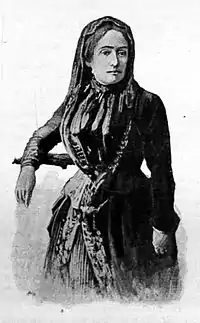Zsófia Torma
Zsófia Torma (September 26, 1832 – November 14, 1899) was a Hungarian archaeologist, anthropologist and paleontologist.

Torma was born in Csicsókeresztúr, Beszterce-Naszód County, Austria-Hungary (today Cristeștii Ciceului, Bistrița-Năsăud County, Romania). She was mostly self-educated. The symbols and scripts on clay objects she found during an excavation in Hunyad County were an archaeological sensation. She also found artifacts of the 6,000- to 7,000-year-old Tordos culture, some of which were covered with Vinca symbols.
Her most well-known work, the Ethnographische Analogien, was published in Jena in 1894.
Torma had an important role in the founding of the National Museum of Transylvanian History of Kolozsvár (present-day Cluj-Napoca), to which she left her archaeological collection in her will. She was the first female to become an honorary doctor in Kolozsvári m. kir. Ferencz József Tudomány Egyetem Bölcsészeti kara, what is today Babeș-Bolyai University, on May 24, 1899. She died in Szászváros (present-day Orăştie) in 1899.
See also
References
- Lozny, Ludomir R., ed. (2011). Comparative Archaeologies A Sociological View of the Science of the Past (1., neue Ausg. ed.). New York, NY: Springer New York. pp. 285, 305. ISBN 9781441982254.
- "Zsófia Torma". Pagina Municipiului Orăștie (in Romanian). Secui Adrian-Iulian. Retrieved 24 May 2014.
- The life work of Zsófia Torma in the Transylvanian Values Collection (in Hungarian)
External links
- Coltofean, Laura. 2017. Zsófia Torma: A pioneer of prehistoric archaeology in nineteenth-century Transylvania. In: Cs. Szabó, V. Rusu-Bolindeț, G. T. Rustoiu, M. Gligor (eds.): Adalbert Cserni and His Contemporaries. The Pioneers of Alba Iulia and Beyond. Mega Publishing House, Cluj-Napoca, 2017: 327-354.
- Coltofean, Laura. 2015. Object Photography in 19th Century Archaeology. The Photographs of Zsófia Torma's Archaeological Collection. Brukenthal. Acta musei X.1: 35-48.
- Coltofean, Laura. 2015. Importanța ediției a opta a Congrès international dꞌanthropologie et dꞌarchéologie préhistoriques în dezvoltarea arheologiei preistorice în Transilvania secolului al XIX-lea / The Importance of CIAAP 1876 in the Development of Prehistoric Archaeology in 19th Century Transylvania. In: ArheoVest, Nr. III / No. III: In Memoriam Florin Medeleț (1943-2005), Interdisciplinaritate în Arheologie [Interdisciplinarity in Archaeology], Timişoara, 28 noiembrie 2015 / 28 November 2015, Vol. 2: Metode Interdisciplinare și Istorie [Interdisciplinary Methods and History]: 1035-1055. ISBN 978-963-315-264-5
- Coltofean, Laura. 2014. Unveiling Zsófia Torma. The Diary of a Woman, an Archaeologist and a Visionary. In: Marler, Joan (ed.), Fifty Years of Tărtăria Excavations. Festschrift in Honor of Gheorghe Lazarovici on the Occasion of His 73rd Birthday. Sebastopol: 258-273.
- Coltofean, Laura. 2012. When Passion is Stronger than Death… Zsófia Torma’s Reflections. Brukenthalia. Romanian Cultural History Review 2: 67-77.
